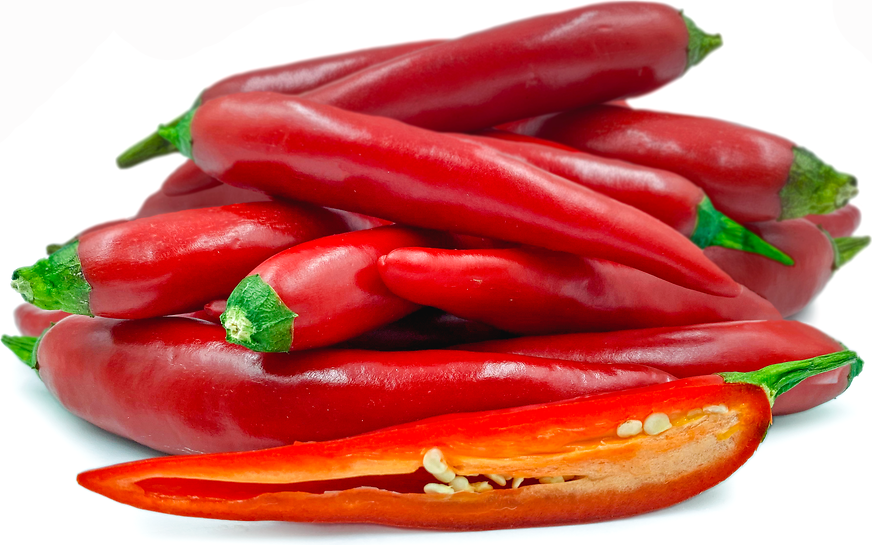


Holland Red Peppers
Estimated Inventory, lb : 0
Description/Taste
Holland Red chile peppers are elongated and slender pods, averaging 10 to 12 centimeters in length, and have a straight to slightly curved, conical shape that tapers to a pointed tip. The skin is smooth, taut, and glossy, ripening from pale green, orange, to bright red when mature. Underneath the surface, the flesh is semi-thin, pale red, aqueous, and crisp, encasing a central cavity filled with orange-red membranes and a few flat and round, cream-colored seeds. Holland Red chile peppers have a fruity, sweet, and slightly acidic flavor with a mild to moderate heat.
Seasons/Availability
Holland Red chile peppers are available year-round, with a peak season in the summer through fall.
Current Facts
Holland Red chile peppers, botanically classified as Capsicum annuum, are common variety found in Western and Central Europe that belongs to the Solanaceae or nightshade family. Also known as Dutch chile peppers, Holland Rode peppers, and Dutch Red chile peppers, Holland Red chile peppers have a mild to moderate heat, ranging from 5,000-10,000 SHU on the Scoville scale and are believed to have been bred from cayenne varieties found in Indonesia. Often being mistaken for the spicier cayenne pepper in markets, Holland Red chile peppers are a favored variety among Asian populations living in Europe and are used in fresh and cooked applications where a small amount of heat is desired without overshadowing the other flavors in the dish.
Nutritional Value
Holland Red chile peppers are a good source of vitamins A, C, B, E, and K, potassium, manganese, and calcium. The peppers also contain capsaicin, which is a chemical compound that triggers the brain to feel the sensation of heat or spice. Capsaicin has been shown to provide anti-inflammatory properties.
Applications
Holland Red chile peppers are best suited for both raw or cooked applications such as frying, sautéing, steaming, roasting, or baking. The peppers can be sliced and tossed into salads, soups, stews, and curries, or they can be blended, minced, or diced into sauces, oils, and pastes. Their mildly spicy flavor is also favored in stir-fries and is commonly served with fried fish. In Indonesian-style dishes in the Netherlands, Holland Red chile peppers are popularly incorporated into seafood, satay or grilled meats, and are mixed into fried rice for added heat. The peppers can also be pickled for extended use as a condiment, or they can be dried and ground into a powder, used similarly to generic chile powder. Holland Red chile peppers pair well with meats such as beef, pork, and poultry, seafood, tofu, eggs, fruits such as mango, pineapple, and orange, bell peppers, lemongrass, mint, cabbage, tomatoes, and ginger. The fresh peppers will keep 1-2 weeks when stored whole and unwashed in a plastic or paper bag in the refrigerator.
Ethnic/Cultural Info
Rijsttafel is a popular meal in the Netherlands inspired by the Indonesian dish nasi padang, which is rice paired with small plates of vegetables and meat. Rijsttafel was initially created by Dutch colonists in Indonesia, desiring to try multiple dishes in one sitting, and with its creation, it also became a meal used to impress visitors touring the colony. The name rijsttafel translates to mean “rice table,” and while not popular in Indonesia, in the modern-day, this feast is widely served at Indonesian restaurants in the Netherlands. Rijsttafel consists of many different dishes with textures such as gelatinous, smooth, chewy, soft, or crispy mixed with spicy, sweet, sour, savory, and tart flavors. Some of the dishes consumed in the feast include satay, pickled vegetables, egg rolls, fruits, curries, soups, and meats such as fish, lamb, poultry, or beef. Within these dishes, Holland Red chile peppers are often used to make sambal oelek, which is a chili sauce served as an accompaniment to the small plates for added flavor and spice. The peppers are also used in a wide variety of other Indonesian dishes in the Netherlands as they are similar in taste to the cabe rawit merah pepper, a cayenne pepper in Indonesia.
Geography/History
Holland Red chile peppers are closely related to red chile peppers in Indonesia and were believed to have been bred from multiple varieties of cayenne peppers found on the tropical islands. Since their introduction into the Netherlands, the Indonesian peppers have been used to create new cultivars to meet the increasing chile pepper demand in Europe. Today Holland Red chile peppers are grown in controlled greenhouses in the Netherlands and are sold at local markets throughout Western and Central Europe.




